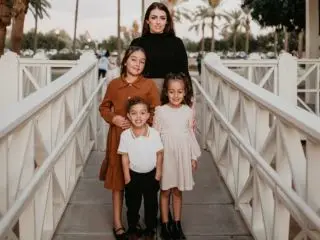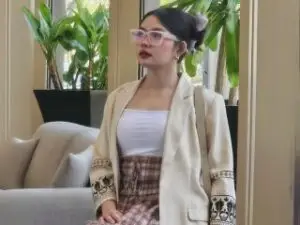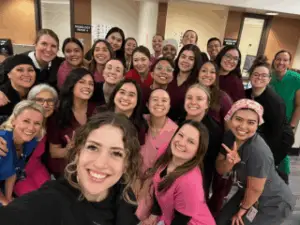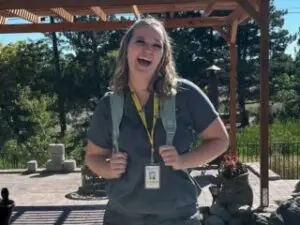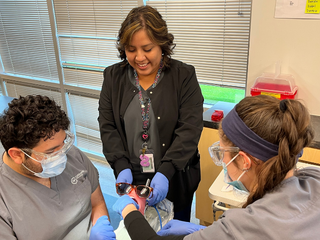 Never say never. When Santana Naha completed Carrington’s Dental Assisting program in 2015, the thought of returning to the Mesa, Arizona campus as an instructor isn’t something that ever crossed her mind. But that’s exactly what happened. After a seven-year career that included positions as a sterilization lab technician, orthodontic and pediatric dental assistant, college instructor and program director, Santana returned to Carrington in January to teach in the same classrooms where she once attended classes. We talked with Santana about her teaching philosophy, how she thinks her experience as a former Carrington student impacts the way she relates to her students, and her goal to help provide quality dental care to children living on the Hopi Reservation.
Never say never. When Santana Naha completed Carrington’s Dental Assisting program in 2015, the thought of returning to the Mesa, Arizona campus as an instructor isn’t something that ever crossed her mind. But that’s exactly what happened. After a seven-year career that included positions as a sterilization lab technician, orthodontic and pediatric dental assistant, college instructor and program director, Santana returned to Carrington in January to teach in the same classrooms where she once attended classes. We talked with Santana about her teaching philosophy, how she thinks her experience as a former Carrington student impacts the way she relates to her students, and her goal to help provide quality dental care to children living on the Hopi Reservation.
How did you become interested in dental assisting as a potential career?
It was an obvious choice, but it took me a while to make it. I grew up on the Hopi reservation. After high school, I joined the Ranger Cadet program and worked with police rangers on the reservation. I considered a career in forensic science (crime investigations) and also thought about becoming a massage therapist. But I ended up pursuing a career as a dental assistant because it was a field I was familiar with. My mother was a dental assistant when I was a little girl. She went on to become a registered dental hygienist. My siblings and I were her practice patients. As a result, I was never afraid of going to the dentist. I also enjoy people and like working with my hands. Once I made the decision to become a dental assistant, I never looked back.
You earned your Dental Assisting certificate in 2015 and returned to Carrington as an instructor in January, 2022. How did you end up back in the classroom?
I worked as a dental assistant for three and a half years before I started teaching at another college. A year and a half later, I became program director. I did that for nearly two years when I learned Carrington had a teaching position available in the Dental Assisting program. I was interested in becoming part of a larger team, and the idea of returning to Carrington really appealed to me—so here I am!
Do you think your experience as a teacher is influenced by having been a student in the same program?
I do. I remember what it’s like to sit where my students are now sitting and to learn everything they’re now learning. Because I’ve been there, I know what it’s like and how challenging it can be. I had two kids—ages 2 and three months—when I started my program, so I also remember what it’s like to balance school, work, and family. I’m so grateful that my husband and family provided a great support system, but I know that not all students experience the same encouragement. Helping students figure out how to prioritize and organize can be as essential to their success as understanding the actual coursework. I think my experience gives me a unique perspective that hopefully makes me a more relatable, understanding teacher. It’s important to me to make learning fun and engaging. I’m committed to training dental assistants who are prepared to go out and do an excellent job.
You know firsthand what it’s like to juggle multiple responsibilities, don’t you?
I do! In addition to teaching, I’m currently completing my associate’s degree in Health Studies. My husband and I also have four children under the age of 10, so my life is never boring. My kids love that I’m a teacher and they always ask if my students are behaving. I think having a mom who is a teacher has really helped spark their own interest in learning and being good students.
What characteristics or qualities do you think good Dental Assistants possess? Can those qualities be taught?
Being a dental assistant requires a desire to help people and to be of service. If you’re not someone who enjoys people, it probably won’t be a good fit because you’re often sitting a foot away from your patients. Those patients can often be nervous or anxious, so it’d important to be understanding and empathetic. I think the best dental assistants possess the same qualities that a good employee in any field does. They’re reliable. They’re team players who are willing to do what it takes to get the job done. Perhaps most of all, they’re good communicators. When you’re a dental assistant, you’re talking with—and listening to—patients, dentists, and your front office colleagues all day. Clear communication and great listening skills are valuable, and I think they can be developed through training and experience.
What would you say to a prospective student who thinks they might be interested in the program?
I would tell them that Carrington provides a supportive, encouraging atmosphere where students often discover they’re far more capable than they realize. Education is a process. My philosophy is that the classroom is the perfect place to make mistakes because that’s how you learn. It’s very inspiring to see students grow and develop over the course of a 36-week program.
What are your goals for the future?
I’d like to eventually open my own practice on the Hopi reservation and help provide dental and oral hygiene care to a population that has long been underserved. Because my mom was a dental assistant and later a dental hygienist, I received good dental care, but I was always aware that many other kids received little or no dental care at all. I want to do what I can to help change that.
